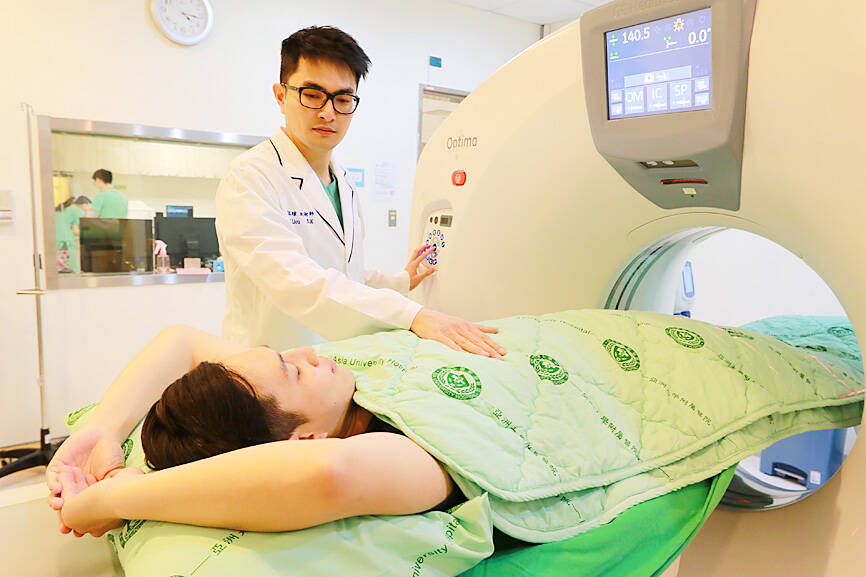Contrast agents used in X-ray and other methods of imaging could increase the risk of developing dementia by 2.09 times, researchers said yesterday.
Contrast agents are widely used in clinical testing to increase the contrast of structures or fluids within the body for imaging, such as computerized tomography (CT) or magnetic resonance imaging (MRI) scans.
According to National Health Insurance Administration (NHIA) data, contrast agents are administered to about 305,000 people annually for CT or MRI scans, with the number increasing every year.

Photo: Chen Chien-chih, Taipei Times
Building on previous evidence suggesting that contrast agents could increase the risk of blood clots by harming the kidneys, the National Health Research Institutes (NHRI) and Taichung Veterans General Hospital conducted a study to investigate any potential correlation between the imaging aids and dementia.
From 11.33 million National Health Insurance card holders, researchers paired nearly 3 million people for analysis after matching variables, half of whom had been administered contrast agents within the previous 10 years.
They found that those who had been administered a contrast agent were 2.09 times more likely to develop dementia than those who had not after adjusting for age, sex and other conditions.
The risk of developing vascular dementia was up to 4.7 times higher, the findings showed.
“Contrast agents should only be used when necessary,” NHRI Institute of Population Health Sciences Deputy Director Hsu Chih-cheng (許志成) told a news conference announcing the results of the study yesterday.
There is no such thing as an entirely safe agent, but if they could be used sparingly and in small quantities by intravenous injection, and if patients drink plenty of water before the test, it could reduce their negative effects on the body, Hsu said.
Some tests require the use of contrast agents, and people who take such tests should be screened for dementia over the following decade, Hsu said.
Hsu also urged doctors to be more cautious in their use of contrast agents, and said patients should consult with their doctor before taking an X-ray-based exam to weigh risk against necessity.
The research is not intended to scare people, but to inform medical practitioners to use contrast agents with caution, said Wu Ming-ju (吳明儒), head of the hospital’s Department of Internal Medicine.
About 10,000 people begin long-term dialysis every year, 24 percent of whom are administered contrast agents before starting, Wu said.
The study was published in the journal Biomedicines in August.
Additional reporting by Hsu Kuo-chen

SHIPS, TRAINS AND AUTOMOBILES: The ministry has announced changes to varied transportation industries taking effect soon, with a number of effects for passengers Beginning next month, the post office is canceling signature upon delivery and written inquiry services for international registered small packets in accordance with the new policy of the Universal Postal Union, the Ministry of Transportation and Communications said yesterday. The new policy does not apply to packets that are to be delivered to China, the ministry said. Senders of international registered small packets would receive a NT$10 rebate on postage if the packets are sent from Jan. 1 to March 31, it added. The ministry said that three other policies are also scheduled to take effect next month. International cruise ship operators

HORROR STORIES: One victim recounted not realizing they had been stabbed and seeing people bleeding, while another recalled breaking down in tears after fleeing A man on Friday died after he tried to fight the knife-wielding suspect who went on a stabbing spree near two of Taipei’s busiest metro stations, Taipei Mayor Chiang Wan-an (蔣萬安) said. The 57-year-old man, identified by his family name, Yu (余), encountered the suspect at Exit M7 of Taipei Main Station and immediately tried to stop him, but was fatally wounded and later died, Chiang said, calling the incident “heartbreaking.” Yu’s family would receive at least NT$5 million (US$158,584) in compensation through the Taipei Rapid Transit Corp’s (TRTC) insurance coverage, he said after convening an emergency security response meeting yesterday morning. National

PLANNED: The suspect visited the crime scene before the killings, seeking information on how to access the roof, and had extensively researched a 2014 stabbing incident The suspect in a stabbing attack that killed three people and injured 11 in Taipei on Friday had planned the assault and set fires at other locations earlier in the day, law enforcement officials said yesterday. National Police Agency (NPA) Director-General Chang Jung-hsin (張榮興) said the suspect, a 27-year-old man named Chang Wen (張文), began the attacks at 3:40pm, first setting off smoke bombs on a road, damaging cars and motorbikes. Earlier, Chang Wen set fire to a rental room where he was staying on Gongyuan Road in Zhongzheng District (中正), Chang Jung-hsin said. The suspect later threw smoke grenades near two exits

The Forestry and Nature Conservation Agency yesterday launched a gift box to market honey “certified by a Formosan black bear” in appreciation of a beekeeper’s amicable interaction with a honey-thieving bear. Beekeeper Chih Ming-chen (池明鎮) in January inspected his bee farm in Hualien County’s Jhuosi Township (卓溪) and found that more than 20 beehives had been destroyed and many hives were eaten, with bear droppings and paw prints near the destroyed hives, the agency said. Chih returned to the farm to move the remaining beehives away that evening when he encountered a Formosan black bear only 20m away, the agency said. The bear